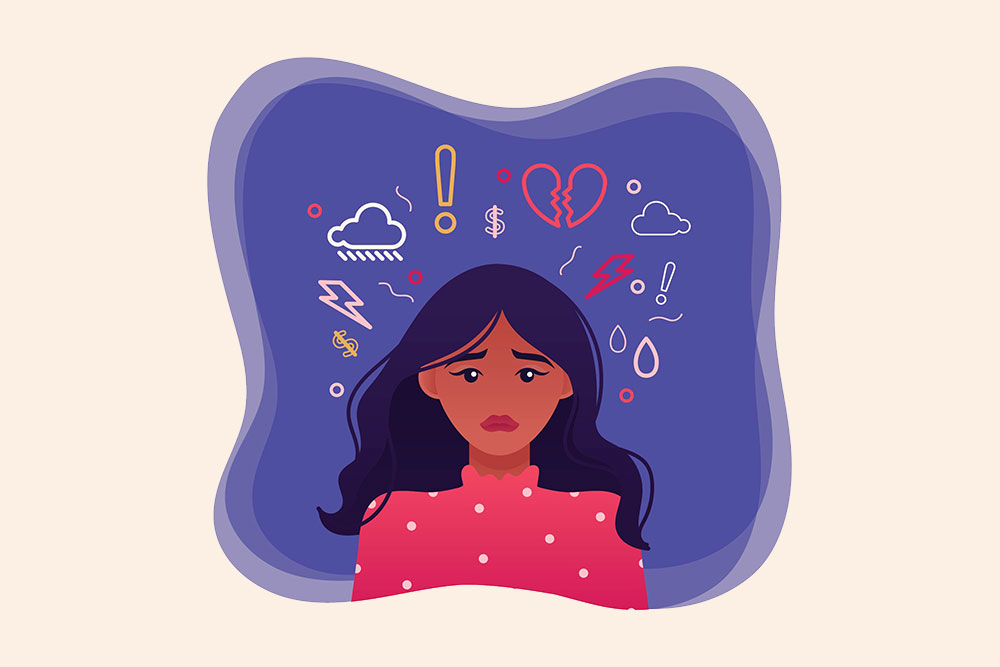Anxiety Disorders And Anxiety Attacks
Published on September 14th, 2020
Updated on February 23rd, 2024

Anxiety is something we feel when something unexpected, unpleasant, uncomfortable, or unpredictable is happening or about to happen. The uncertainty of an outcome, or simply the idea of something happening or not happening, can affect us so much that our bodies and minds react through visible and palpable symptoms.
Anxiety can affect a person so strongly that they feel like they are in danger of something harmful happening. It causes several uncomfortable symptoms, like:
- Racing thoughts
- Paranoia
- Sweating
- Stomachaches
- Dizziness
- Nausea

Sponsored by

Choose a therapist to work with and start healing with 20% off from BetterHelp.
Click HereWhat Is An Anxiety Disorder?
Anxiety is something everyone experiences, but there are people who chronically experience symptoms. When anxiety affects a person’s ability to cope with their day-to-day, it may mean they are suffering from an anxiety disorder.
Many people with anxiety disorders do not know what they are experiencing is anxiety. Sometimes they even believe that it is a typical reaction that everyone experiences, which is not always the case.
Everyone will experience anxiety at some point in their life. It is an emotion that can be triggered by several factors. Sometimes it will be triggered by recognizable situations and sometimes it will be triggered by circumstances that are more difficult to identify and understand. To be diagnosed with an anxiety disorder implies that the anxiety that is experienced is:
- Chronic or cyclical
- Draining
- Has a major negative impact on the quality of life of the affected person
Common Causes Of Anxiety Disorders
Everyone will have their own triggers for stress and anxiety. Some people will have unique stressors that will trigger different types of anxiety. Different factors can cause an anxiety disorder, which is a chronic condition of anxiety.
Common factors that may cause an anxiety disorder include:
Heredity And Family History
If you have an immediate family member with chronic or excessive anxiety, you are at high risk of also experiencing heightened anxiety. This could be due to genes or learning modeled anxious behavior from others during upbringing. It is possible to be genetically predisposed to anxiety.
Change
Change can be scary for people. When a person is exposed to significant change, they can feel vulnerable. Having to adjust to significant changes can cause a person to experience heightened anxiety. Changes that can cause anxiety include:
- Moving
- Job promotion
- Change in the family dynamic
- Aging
- Difficulty adapting to different cultures
- Grief and loss
Environment
Living, working, or attending school in a chaotic, volatile, or unhealthy environment can cause anxiety. People in an unhealthy or chaotic environment feel unsafe. This unsafe feeling causes people to feel insecure and on edge. Prolonged exposure to a stressful environment can cause chronic anxiety. This chronic anxiety caused by your environment can carry over to other areas of your life.
Types Of Anxiety
There are many different types of anxiety disorders that a person may suffer from. Each disorder may have unique symptoms, causes, and methods of treatment. They also typically have thought and behavior patterns in common with one another.
Different types of anxiety disorders include:
- Generalized Anxiety Disorder (GAD). GAD causes a person to experience chronic anxiety. Severity can vary, but it is a part of the person’s thought patterns and lifestyle for those with GAD. GAD will cause a person to overthink and over-analyze relatively harmless or insignificant events. It will also cause strong and unpleasant reactions to anything that is out of the norm or comfort zone.
- Separation Anxiety Disorder. Separation anxiety typically begins during childhood and causes excessive fear associated with the idea of being separated from their home or their parents / significant people in their life. They may fear things like the death of their family members, getting kidnapped or lost, or any situation that would prevent them from reuniting with their significant loved ones.
- Selective Mutism. Children with selective mutism will struggle with speaking in conversation. These children will have triggering situations in which they cannot engage in conversation with others, and situations where they are able to speak and interact with people who are trusted or in situations where they feel safe.
- Panic Disorder. Panic disorder is a disorder in which a person experiences frequent and recurrent panic attacks. These panic attacks may or may not be triggered by real-life situations or challenges.
- Specific Phobias. Phobias are the extreme and irrational fear of something non-threatening. These things may either be situations that do not pose an immediate threat or objects that are not threatening or objectively less threatening than the affected person perceives them to be.
- Social Anxiety Disorder. Social anxiety disorder refers to a person experiencing extreme discomfort in social situations. Social phobia is often associated with low confidence and poor self-esteem.
- Adjustment Disorder. Adjustment disorder causes anxiety and distress in response to sudden changes or life challenges. The condition is typically resolved once the affected person successfully transitions into their new circumstances.

What Is An Anxiety Attack?
Having an anxiety attack (panic attack) is a scary experience. It causes uncomfortable symptoms that can be scary and upsetting. It is not uncommon for a person who is having an anxiety attack to not understand what is happening to them. Since an anxiety attack has physical symptoms, people can confuse it for a medical emergency.
An anxiety attack can be triggered by something known or can happen unexpectedly. It occurs as a result of being overwhelmed with anxiety. Sometimes, that anxiety can seemingly come out of nowhere. It is not uncommon for a person to have an anxiety attack and not know what is causing the panic or anxiety.
Anxiety attacks are commonly seen with anxiety disorders and mood disorders. They can be a symptom of different disorders as well. Having anxiety attacks may be the result of panic disorder, but may also be a symptom of other disorders and mental health issues.
Symptoms Of An Anxiety Attack
An anxiety attack causes an affected person to feel many distressing sensations. During a severe anxiety attack, you may feel like you are dying or experiencing a medical emergency. These sensations are scary and typically last for about 10 minutes. Symptoms can be confused with a medical emergency because of how intense they can feel, but new or troubling sensations should be taken seriously and addressed by a medical professional.
Symptoms of an anxiety attack include:
- Feeling faint
- Dizziness
- Nausea
- Lightheadedness
- Hyperventilating
- Disorientation
- Racing heartbeat
- Pins and needles throughout the body
- Chest pain
How Anxiety Is Treated
It is important to seek therapy for anxiety disorders. Therapy helps a person learn how to cope with their symptoms. If an anxiety disorder is not addressed it could lead to consequences. Some consequences include:
- Depression
- Paranoia
- Relationship issues
- Academic or work performance issues
Anxiety can cause muscle tension, headaches, and hypertension. It can also affect the immune system, causing someone who is sick to have a hard time getting better.
Fortunately, there are therapeutic approaches that can help a person learn to manage anxiety. Cognitive and behavioral therapies are particularly effective in reducing negative self-talk. This lessens the intensity of symptoms and helps the affected person stay in control of their thoughts and emotions.
The following forms of therapy are helpful for anxiety:
- Cognitive Behavioral Therapy (CBT) teaches a person how to manage their thoughts so they do not create anxious feelings. CBT also helps to minimize negative self-talk and irrational beliefs.
- Dialectical Behavioral Therapy (DBT) incorporates mindfulness exercises into cognitive therapy. Mindfulness helps with relaxing the body and mind, which lessens the intensity of emotional reactions to stress, anxiety, and negative thoughts.
- Exposure therapy is particularly helpful for people who are suffering from a phobia or have a history of trauma. In exposure therapy, a person is repeatedly exposed to their triggers for anxiety.
Anxiety is uncomfortable and challenging to live with, but recovery is possible. Learning about how anxiety affects you and what you need to cope with the experience can help you feel better. Seek support from a therapist to learn how to cope with anxiety and manage anxiety attacks.
Sponsored by

Find an affordable therapist online with 20% off from BetterHelp.
Click Here






Leave A Reply